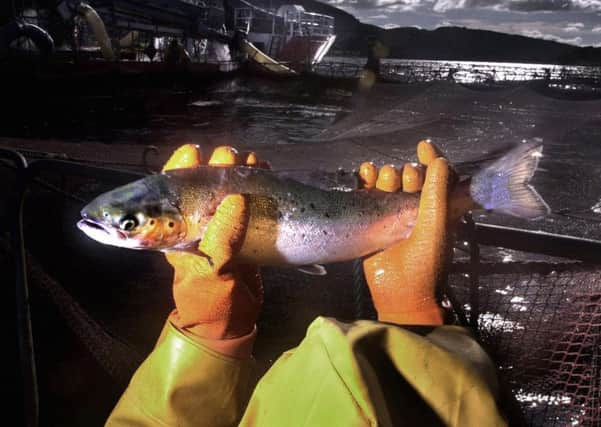Call for curb in fish farms as study shows pest risk to wild fish


The study, carried out by scientists at the Norwegian Institute for Nature Research (NINA), has found “a general and pervasive negative effect of salmon lice on salmonid populations in intensively farmed areas of Ireland, Norway and Scotland”.
The report concludes: “Scientific studies indicate that salmon farming increases the abundance of salmon lice in the marine habitat and that salmon lice in the most intensively farmed areas have negatively impacted wild Atlantic salmon and sea trout populations.”
Advertisement
Hide AdAdvertisement
Hide AdCampaigners at the charity Salmon & Trout Conservation (S&TC) Scotland, which commissioned the study, say the results back calls for the Scottish Government to rethink its drive to expand the aquaculture sector and increase farmed salmon production.
They claim the plans are “untenable” and steps should be taken to limit the number of fish farms in Scottish seas to help safeguard wild fish and halt dramatic declines in populations.
Andrew Graham-Stewart, director of S&TC Scotland, said: “For many years we have maintained that the Scottish Government’s position – that there is ‘no evidence’ in Scotland that sea lice from salmon farming damage wild salmon and sea trout populations – is untenable.
“This report substantiates our view that it would be very odd indeed if the Scottish situation was markedly different to elsewhere.
“We do, after all, have the same sea lice, which all too often Scottish salmon farm operators are incapable of keeping under control, and the same wild fish.”
Don Staniford, director of the campaign group Global Alliance Against Industrial Aquaculture, has backed the calls.
He said: “The weight of scientific evidence is overwhelming – salmon farms are killing wild salmon and sea trout.
“The Scottish Government need to stop ignoring the science and start protecting Scotland’s iconic wild salmon and sea trout. “That means closing down salmon farms on migration routes of wild fish and relocating the industry to closed containment on land.”
Advertisement
Hide AdAdvertisement
Hide AdSea lice feed by grazing on the surface of fish, eating the mucous and skin. The parasites occur naturally in the marine environment, but serious infestations can cause the loss of fins, severe scarring, secondary infections and eventually death.
Effective control of the pests is one of the biggest problems facing fish farm operators. Infestations resulted in the deaths of more than a million fish at farms in Scotland in 2016.
But Dr Martin Jaffa, an independent marketing consultant and advocate of aquaculture, claims fish farms are “a convenient scapegoat” for declines in wild salmon and sea trout.
He says many populations far from fish farm sites are in “dire straits” so there are obviously there are other factors to blame.
“I’m not saying there’s no impact,” he said.
“But the longer we focus on fish farms the less we’re looking at other things that are important such as climate change or illegal fishing.
“I see no reason why production of farmed salmon should not be increased.
“We need to work together to find solutions.”
A Scottish Government spokeswoman said: “The Scottish Government takes its responsibility to protect the marine environment extremely seriously and the decline in wild fish stocks is a matter of great concern.
“We know that a number of complex factors, including climate change, are impacting on wild salmon numbers in the north-east Atlantic and that Scotland is one of several countries which have been affected.
Advertisement
Hide AdAdvertisement
Hide Ad“Against this backdrop, it is vital that we do everything we can to safeguard wild salmon stocks and we will continue to work with the aquaculture industry, which employs more than 12,000 people in Scotland, to ensure investment and innovation deliver the highest possible environmental standards.”
A parliamentary inquiry into the impacts of salmon farming has being carried out, with the results expected this year.